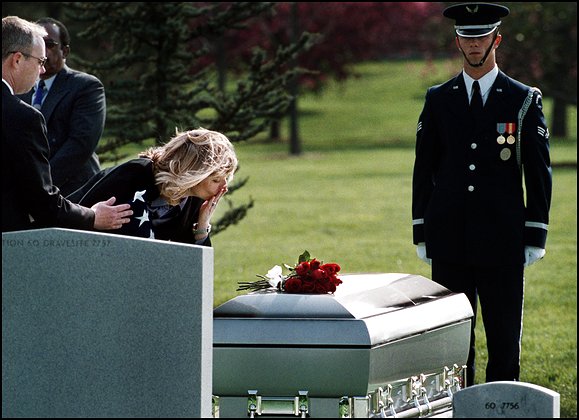
Guard Major Gregory Stone during his burial at Arlington National Cemetery.
They died differently, one killed in a fierce firefight in Iraq, the other in a grenade attack by a fellow airman in Kuwait, but Marine Lance Corporal Patrick Nixon and Air National Guard Major Gregory Stone were buried side by side yesterday in the soil of Arlington National Cemetery.
On a breezy, sun-drenched morning, Stone’s flag-draped casket, borne on a horse-drawn caisson with a riderless horse leading the way, was the first to arrive at the waiting graves. As a band played “America the Beautiful” in the distance, more than 200 relatives, friends and military personnel gathered to honor the memory of the 40-year-old Idaho man.
The chaplain, Air Force Captain Mark Thomas, said Stone “leaves a legacy worth modeling: husband, loving father, an obedient son and a proud American.” Calling Arlington a fitting place for Stone, Thomas said he would “rest here with those of like mind and determination, the determination to see this nation remain a beacon of light to a world searching true liberty.”
Brigadier General Gary L. Sayler, commander of the 124th Wing of the Idaho Air National Guard, presented Stone’s Bronze Star to his family, including his two children, Alex, 11, and Joshua, 7. At the close of the lonely call of Taps, flags were presented to Stone’s fiancee, Tammie Eslinger, and his parents, Richard Stone and Betty Lenzi.
Eslinger walked slowly to the grave and laid a bouquet of red roses on the casket, then walked away as family members silently touched it one last time. The last mourner to approach, in a wheelchair with his left leg heavily bandaged, was Army Captain Andres Marton, who was injured in the attack that killed Stone.
Marton saluted Stone and was wheeled away.
Stone died March 25, two days after a fellow officer tossed a grenade into the officers’ tent. Another soldier, Army Captain Christopher S. Seifert, 27, died in the attack, and 14 were injured. Sergeant Hasan K. Akbar has been charged in the attack.
“People are still shocked that one of our own turned on one of our own,” Air Force Staff Sergeant Mitch Kelly said after the ceremony. He, with five colleagues, drove from Pope Air Force Base in North Carolina to pay his respects.
Air Force Senior Sergeant. Mike McKee, who had worked with Stone, called him “one of those guys where you wish you had 100 more like him.” McKee said that “there’s a little more bitterness” because of how Stone died, but that “the way it happened ultimately doesn’t matter. The result is the same.”
The result, as Marine Chaplain Robert Beltram described it an hour later at the adjacent grave, was the “greatest sacrifice to this great nation.”
Beltram remembered Patrick Nixon, 21, as a man with a “strong sense of self” and a strong sense of loyalty to the Marines. Nixon, who served with the 1st Battalion, 2nd Marine Regiment, 2nd Marine Expeditionary Brigade from Camp LeJeune, North Carolina, died in battle March 23 when his unit was ambushed by Iraqi soldiers as they pretended to surrender near Nasiriyah in southern Iraq.
More than 70 family members and friends followed his coffin as it was carried to his grave site by six fellow Marines. As jets streaked across the sky and wind swayed the funeral flowers, Nixon was remembered as a young man who always wanted to be a Marine.
Beltram said Nixon, a native of Gallatin, Tennessee, who moved to Bucks County, Pennsylvania, with his now-late mother, planned to be a history teacher. “He has written history now,” Beltram told the mourners. “His name is etched in the annals of our history.”
After the brief eulogy, Taps called for the second time that morning, and a rifle volley cracked again. Then the six Marines folded the flag from Nixon’s casket and presented it to his grandmother, Mary Nixon, who wiped away tears. Sitting next to her was the slain Marine’s father, David Nixon, who wept as he was handed his son’s Purple Heart from Brigadier General Maston Robeson.
A young mourner placed two flowers — one yellow, one red — on the casket. The wind blew them off, but they were gently replaced. After almost everyone had left, Lieuenant James Reid, Nixon’s platoon commander, knelt silently at the grave.
Stone and Nixon were the fifth and sixth Iraq War veterans buried at Arlington. Eight more burials have been scheduled.
Michael Robert Patterson was born in Arlington and is the son of a former officer of the US Army. So it was no wonder that sooner or later his interests drew him to American history and especially to American military history. Many of his articles can be found on renowned portals like the New York Times, Washingtonpost or Wikipedia.
Reviewed by: Michael Howard
